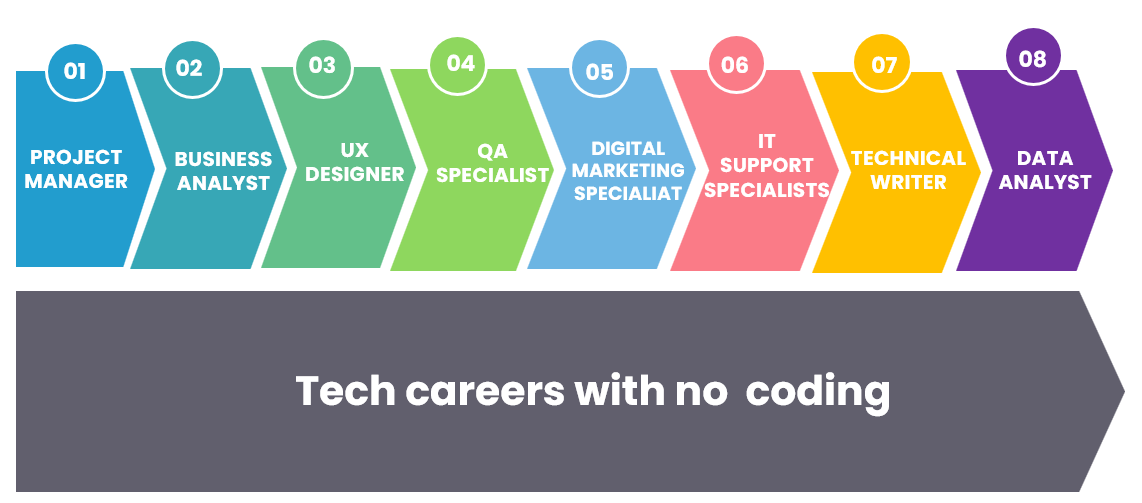Top Tech Careers That Don’t Require Coding Skills
In today’s rapidly evolving technological landscape, pursuing a career in tech doesn’t necessitate proficiency in programming. Numerous roles leverage other skill sets, offering lucrative opportunities without the need for coding expertise. Below, we explore some of the top tech careers that don’t require coding skills.
1. Project Manager
Role Overview:
Project Managers oversee technology projects from inception to completion, ensuring they align with business objectives, stay within budget, and meet deadlines. They coordinate between various teams, manage resources, and mitigate risks to deliver successful project outcomes. Project Manager is a top tech careers that don’t require coding skills.
Key Responsibilities of a project manager:
- Defining project scope and objectives
- Developing detailed project plans
- Managing budgets and resources
- Communicating with stakeholders
- Monitoring project progress and adjusting plans as necessary
Essential Skills:
- Strong organizational and leadership abilities
- Excellent communication and interpersonal skills
- Proficiency in project management tools (e.g., Microsoft Project, Asana)
- Problem-solving and critical thinking
- Ability to manage multiple tasks simultaneously
Career Pathway: A bachelor’s degree in business administration or a related field is often preferred. Certifications such as Project Management Professional (PMP) can enhance job prospects. Experience in managing projects and familiarity with project management methodologies (e.g., Agile, Scrum) are advantageous.
2. Business Analyst
Role Overview:
Business Analysts act as liaisons between IT departments and business units. They analyze processes, identify areas for improvement, and recommend technological solutions that align with business goals.
Become a business analyst by getting expert guidance, with live in-person training with weekly touch points. You will get access to real projects, real documentation and a community of other business analysts.
Business Analyst is a top tech careers that don’t require coding skills.
Key Responsibilities of a business analyst:
- Gathering and documenting business requirements
- Analyzing data to inform decision-making
- Developing process models and workflows
- Facilitating communication between stakeholders
- Evaluating the impact of proposed solutions
Essential Skills:
- Analytical thinking and problem-solving
- Strong communication and documentation skills
- Understanding of business processes and practices
- Proficiency in data analysis tools (e.g., Excel, Tableau)
- Ability to translate technical information into business terms
Career Pathway: A degree in business administration, finance, or a related field is beneficial. Get the best guidance with expert programs like the Back Office Club. Certifications like Certified Business Analysis Professional (CBAP) can enhance credibility. Experience in business analysis or related roles is often required.
3. User Experience (UX) Designer
Role Overview:
UX Designers focus on enhancing user satisfaction by improving the usability, accessibility, and pleasure associated with a product. They conduct user research and design interfaces that provide seamless user experiences.
Key Responsibilities:
- Conducting user research and testing
- Creating user personas and journey maps
- Designing wireframes and prototypes
- Collaborating with developers and stakeholders
- Ensuring designs align with user needs and business goals
Essential Skills:
- Proficiency in design tools (e.g., Sketch, Adobe XD)
- Strong understanding of user-centered design principles
- Excellent communication and collaboration skills
- Ability to interpret user research and feedback
- Creative problem-solving abilities
Career Pathway: A background in design, psychology, or human-computer interaction is advantageous. Building a strong portfolio showcasing UX projects is crucial. Certifications or courses in UX design can provide foundational knowledge and skills.
4. Technical Writer
Role Overview:
Technical Writers create documentation that explains complex technical information in an accessible manner. This includes user manuals, how-to guides, and online help sections.
Key Responsibilities:
- Researching and understanding technical products or services
- Writing clear and concise documentation
- Collaborating with developers and product managers
- Updating and maintaining existing documentation
- Ensuring consistency and clarity in all technical content
Essential Skills:
- Exceptional writing and communication skills
- Ability to understand complex technical information
- Attention to detail
- Proficiency in documentation tools (e.g., MadCap Flare, Adobe FrameMaker)
- Organizational and time-management skills
Career Pathway: A degree in English, communications, or a related field is often preferred. Experience in technical writing or familiarity with the industry can be beneficial. Building a portfolio of writing samples can demonstrate expertise to potential employers.
5. Digital Marketing Specialist
Role Overview:
Digital Marketing Specialists develop and implement online marketing strategies to promote products or services. They utilize various digital channels to reach and engage target audiences. Digital Marketing Specialist is a top tech careers that don’t require coding skills.
Key Responsibilities:
- Planning and executing digital marketing campaigns
- Managing social media platforms
- Analyzing website traffic and user engagement
- Optimizing content for search engines (SEO)
- Collaborating with designers and content creators
Essential Skills:
- Understanding of digital marketing tools and platforms (e.g., Google Analytics, SEMrush)
- Strong communication and creative skills
- Analytical abilities to interpret data and metrics
- Knowledge of SEO and content marketing strategies
- Ability to adapt to changing digital trends
Career Pathway: A degree in marketing, communications, or a related field is beneficial. Certifications in digital marketing can enhance job prospects. Practical experience through internships or projects can provide hands-on skills and knowledge.
6. IT Support Specialist
Role Overview:
IT Support Specialists assist users with technical issues, providing support for hardware, software, and network problems. They ensure that IT systems run smoothly and efficiently.
Key Responsibilities:
-
- Troubleshooting and resolving technical issues
- Installing and configuring hardware and software
- Providing support to end-users
- Maintaining IT documentation
- Collaborating with other IT professionals
Essential Skills:
- Strong problem-solving abilities
- Excellent communication and interpersonal skills
- Knowledge of operating systems and networking
- Patience and customer-service orientation
- Ability to work under pressure
Career Pathway: A degree in information technology or a related field is advantageous. Certifications such as CompTIA A+ or Microsoft Certified IT Professional (MCITP) can enhance employability. Experience in customer service or technical support roles is beneficial.
7. Quality Assurance (QA)
Role Overview:
The Quality Assurance Specialist or QA, is the person who tests the system to discover bugs, document those bugs and communicate them to get it fixed. This has usually no programming and is great because QAs work so closely with the software without having to code it!
The QA also ensure that the software meets certain quality standards and is usually working directly with the developers, implementation specialist, business analyst and project managers to ensure the integrity and quality of the software is maintained.
Key Responsibilities:
- Developing test plans and cases
- Executing tests and reporting defects
- Collaborating with developers to resolve issues
- Documenting test results
- Ensuring compliance with quality standards
Essential Skills:
- Attention to detail
- Analytical and critical thinking
- Understanding of software development life cycle
- Proficiency in testing tools (e.g., Selenium, JIRA)
- Strong communication skills
Career Pathway: A degree in computer science or a related field is often preferred but not always required. Certifications in software testing can be beneficial. Experience in testing or related areas can provide practical knowledge and skills.
8. Data Analyst
Role Overview:
Data Analysts interpret complex data sets to help organizations make informed business decisions. They collect, process, and analyze data to identify trends and patterns.
Here isan article with the difference between a business analyst and a data analyst
Key Responsibilities:
- Collecting and interpreting data
- Analyzing results using statistical techniques
- Developing and implementing data analyses
- Creating reports and dashboards
- Collaborating with stakeholders to inform business decisions
Essential Skills:
- Proficiency in data analysis tools (e.g., Excel, SQL, Tableau)
- Strong analytical and problem-solving skills
- Attention to detail
- Ability to communicate complex information clearly
- Understanding of statistical methods
Conclusion
So there you have it – a number of IT jobs where you don’t have to code!
Now go find these jobs on :





